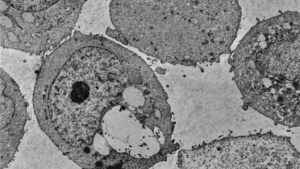Newly discovered target overcomes drug resistance in lethal blood cancer
COLD SPRING HARBOR, N.Y., Sept. 25, 2019 /PRNewswire/ -- Myelodysplastic syndrome (MDS), one of the most common blood cancers, has very few treatment options. Now, researchers at Cold Spring Harbor Laboratory (CSHL) have discovered a new and promising drug target for this deadly condition.
"At the moment, only a small portion of patients benefit from the standard therapy for MDS," said CSHL Fellow and cancer researcher Lingbo Zhang. "Therefore, there is a very important medical need for a new and novel therapy for this disease."
Zhang's lab, working with experts from Memorial Sloan Kettering Cancer Center and the National Institute of Diabetes and Digestive and Kidney Diseases, discovered the new drug target that could meet this need. Their research was recently published in Science Translational Medicine.
"We have been working with a multidisciplinary team that consists of physicians and medicinal chemists to translate our basic discovery into novel therapeutics which can be tested in clinical trials for the benefit of patients," Zhang said.
The ultimate goal, Zhang said, is to create a drug that will adequately restore blood cell production in MDS patients who are resistant to existing treatments.
Because MDS is defined by having too few healthy blood cells in the body, most common MDS treatments target immature blood cells inside the bone marrow, known as progenitor cells. Having matured en-masse from an even younger stage of progenitor cells, these cells often just need the right push to become the mature blood cells that an anemic MDS patient so desperately needs.
However, in many cases of MDS, these cells are found in such small numbers that targeting them is ineffective. That's why Zhang and his team took a different approach. By addressing a defect in the younger cells that these progenitor cells spawn from, the researchers sought to restore the healthy production of progenitor cells.
In mice genetically designed to mirror the pathological features of human MDS, the researcher showed that this strategy significantly improves survival rates.
"More importantly, these early animal tests have shown that the treatment exhibited a sustained and long-term therapeutic efficacy," Zhang said. "We're now translating this discovery into clinical development, and we hope our progress will benefit patients in the near-future."
About Cold Spring Harbor Laboratory
Founded in 1890, Cold Spring Harbor Laboratory has shaped contemporary biomedical research and education with programs in cancer, neuroscience, plant biology and quantitative biology. Home to eight Nobel Prize winners, the private, not-for-profit Laboratory employs 1,100 people including 600 scientists, students and technicians. For more information, visit http://www.cshl.edu
SOURCE Cold Spring Harbor Laboratory

Related Links
WANT YOUR COMPANY'S NEWS FEATURED ON PRNEWSWIRE.COM?
Newsrooms &
Influencers
Digital Media
Outlets
Journalists
Opted In






Share this article